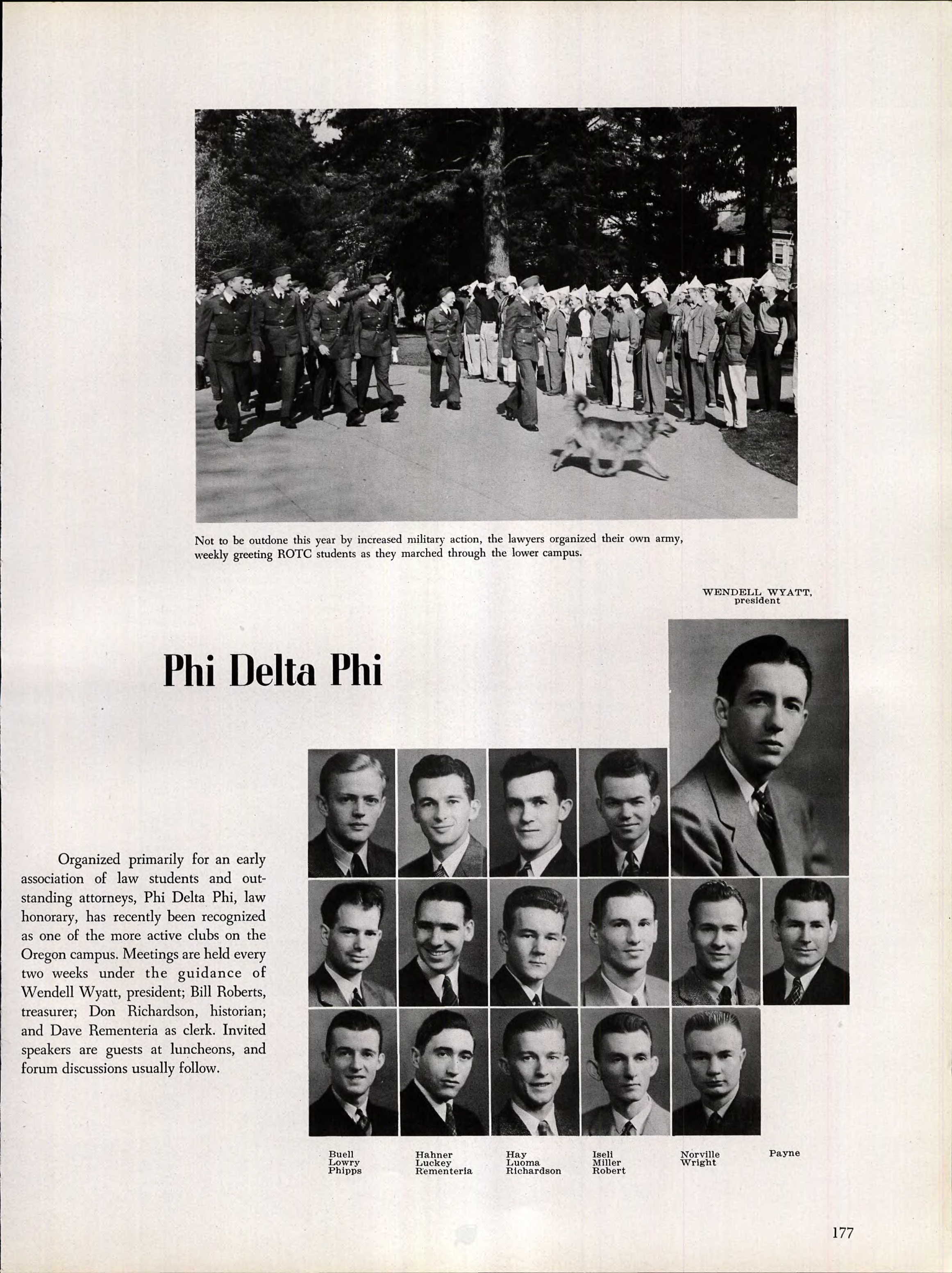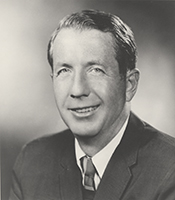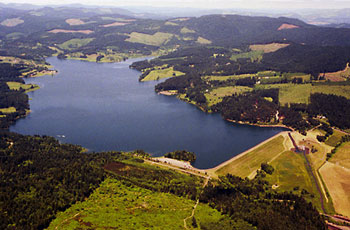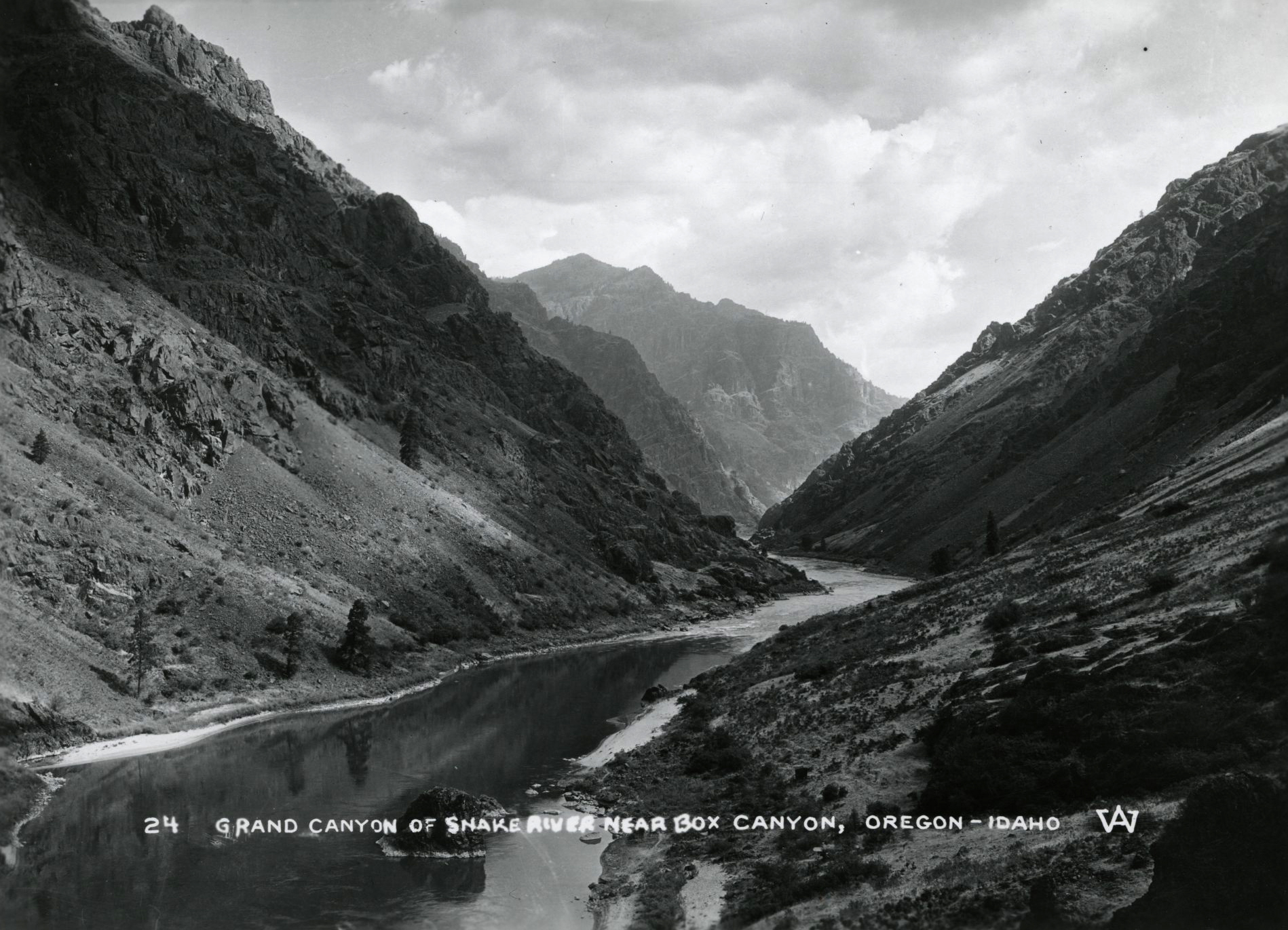Representing Oregon’s First Congressional District from 1964 to 1975, Wendell Wyatt was a voice of Republican moderation in the U.S. House of Representatives and was notable for his ability to work with people from both political parties. The Edith Green–Wendell Wyatt Federal Building in Portland serves as a reminder of his influence and collaboration with Democratic members of Congress, including Edith Green, who represented Oregon’s Third Congressional District from 1955 to 1974.
Wendell Wyatt was born in Eugene on June 15, 1917. He graduated from Jefferson High School in Portland in 1935 and received a Bachelor of Laws degree from the University of Oregon in 1941. While at the university, he developed a personal relationship with the dean of the law school, Wayne Morse, a notably independent U.S. senator from Oregon from 1945 to 1969.
After service as a pilot in the U.S. Marines during World War II, Wyatt moved to Astoria to work in the law office of A.W. Norblad, a former Republican governor of Oregon. Wyatt had a long-standing interest in Republican politics, and he initially devoted himself to internal party politics, serving as the county party chair and as chair of the Oregon State Republican Central Committee from 1955 to 1957. As a Republican Party insider, he was a delegate to several national conventions. An early and strong supporter of Richard M. Nixon, he served as his Oregon chair in 1960, organizing events early in the short-lived 1964 campaign, and serving prominently in the campaigns of 1968 and 1972.
Wyatt had considered withdrawing from Republican political activism in 1964 because of his dislike of the Barry Goldwater conservative wing of the party, but the death of U.S. Congressman A. Walter Norblad, his law partner’s son, changed his mind. He ran for the empty seat in the 1964 special election, winning with roughly 52 percent of the vote. His success was notable, since Republicans across the country lost races due to the coattail effects of the Lyndon Johnson–Barry Goldwater presidential election. For his first two terms, he was the only Oregon Republican serving in the House, although he always won re-election easily.
In Congress, Wyatt’s work focused on issues of local or state concern, particularly economic development. His relationships with Democratic House leaders such as Wayne Aspinall (D-Colorado) and Thomas Foley (D-Washington), as well as Edith Green, enabled him to have significant legislative success despite his affiliation with the minority party. A key element of his legislative success was using his membership on both the Interior and Appropriations Committees, which were responsible for authorizing and funding the public works projects he valued.
Wyatt had a 27 percent lifetime score from the League of Conservation Voters, a reflection of his fiscal conservatism over mass transit and support for energy development, including nuclear energy and the Alaskan Pipeline project. His most noted accomplishments included funding the Scoggins Dam and Henry Hagg Lake in Washington County and the establishment of a forty-foot shipping channel in the Columbia River from Astoria to Portland. Wyatt was instrumental in the designation of the Cascade Head Scenic Area in Lincoln County, an important environmental legacy. He also supported the effort to establish Hells Canyon National Recreational Area and a bill authorizing the $4 million purchase of ranchlands along the Snake River for public recreation.
"As a congressman,” Bob Caldwell, a journalist with the Oregonian, wrote, “Wyatt was pro-choice, pro-gun-control and the driving force behind efforts to bring commerce to Oregon via the Columbia River.” His support for river development, most notably the passage of a bill to deepen the Columbia River channel to forty feet, was appreciated by Astorians and the river community. Strongly committed to constituency service, he prided himself on his direct personal relationship with and service to his district voters. At one point, his campaign motto was: "Wendell Wyatt, your door-to-door Congressman."
In 1975, Wyatt pleaded guilty and paid a fine for failing to properly report spending activities when he was chair of the Nixon campaign in 1972. The amount involved was relatively minor, between $1,500 and $2,000, but it was a high-profile issue due to Nixon's forced resignation. Although records do not show an explicit connection, the 1974 elections were marked by the retirement of many members of Congress, including Wyatt, and the New York Times noted that for many Republicans it was linked to a fear of voter reaction to the Watergate affair. Democrat Les AuCoin won the First District in the 1974 election, a seat that has been filled by Democrats ever since.
After his retirement from politics, Wyatt worked as a partner in the law firm of Schwabe, Williamson & Wyatt and remained active in Republican politics. He also served as a commissioner for the Port of Portland from 1975 to 1979.
Wendell Wyatt died in Portland on January 29, 2009.
-
![]()
Photo of Wendell Wyatt in the University of Oregon yearbook, 1941.
Courtesy U.S., School Yearbooks, 1880-2012, University of Oregon, 1941
-
![]()
-
![]()
Congressional desk that belonged to Wendell Wyatt, 1964-1975.
Oregon Historical Society Museum Collection, 2019-26.1
Related Entries
-
![Columbia River]()
Columbia River
The River For more than ten millennia, the Columbia River has been the…
-
![Edith Starrett Green (1910-1987)]()
Edith Starrett Green (1910-1987)
Democrat Edith Starrett Green represented Oregon’s 3rd Congressional Di…
-
![Henry Hagg Lake]()
Henry Hagg Lake
Henry Hagg Lake is a manmade reservoir located in Scoggins Valley, just…
-
![Snake River]()
Snake River
The Snake River has its headwaters at an elevation of 8,200 feet on the…
-
![Wayne Morse (1900-1974)]()
Wayne Morse (1900-1974)
Wayne Morse and the Vietnam War: the name and the conflict will be fore…
Related Historical Records
Map This on the Oregon History WayFinder
The Oregon History Wayfinder is an interactive map that identifies significant places, people, and events in Oregon history.
Further Reading
"Four More Representatives Plan to Retire Before the Next Election." New York Times, February 16, 1974.
Kelly, Ann. Wendell Wyatt, Republican Representative from Oregon Ralph. Washington, DC: Grossman Publishers, 1972.
"North Coast mourns former Oregon Congressman Wendell Wyatt", The Daily Astorian (January 28, 2009)
Wyatt, Wendell, interviewed by Randall Weisberg, January 28-March 24, 1992. SR 1228, Oregon Historical Society Research Library, Portland.
“Wendell Wyatt: Success through personal values.” Oregonian, January 30, 2009.
Wyden, Ron. "Remembering Wendall Wyatt." Congressional Record 155.28 (Wednesday, February 11, 2009): S2135-S2138.








